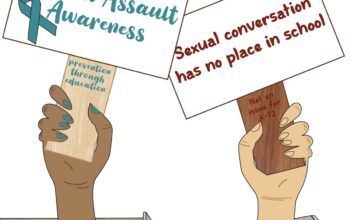John Bemis
@bemiscourant
Web Director
Before I begin, I should make known one very important factor of my stand: I am not a fan of Tyler, the Creator. I didn’t enjoy him when he was the loudest mouth of Odd Future, I didn’t enjoy him when he professed his dreams as a filmmaker. I didn’t enjoy him when he griped for sincerity, I didn’t enjoy him when last year’s Cherry Bomb recieved the worst review I have ever written. To this day, I never find myself giving him a repeated listen for any sort of enjoyment. That being said, I would never suggest in any number of scathing reviews that his weak rhymes or unfoundedly obnoxious personality should warrant him a ban from a world nation.

Graphic by Ev Jensen
This does not appear to be a shared mindset among UK home secretary Theresa May and her staff, who on September 1st issued Tyler a 3 to 5 year ban from the entire United Kingdom on the grounds that his lyrics from 2009’s Bastard and 2011’s Goblin qualified as “behaviors unacceptable in the U.K”.
To Ms. May, to any other UK officials who approved Tyler’s ban, I must ask, what exactly is unacceptable? As far as has been reported, Tyler hasn’t assaulted anybody physically or sexually and is, remarkably, one of the few rappers in recent years whom I can recall not once starting beef with another artist. This isn’t 1977, it’s not as if he has directly dissed the monarchy. It’s pretty clear that 2015 Tyler is the same goofy brat that he was in 2008, when he was writing the lyrics that he is now being banned for.

Now I’ll admit, the lyrics he’s being punished for leave little to the idea of political correctness, or common decency for that matter. The UK cited many lyrics, namely those from songs “VCR,” “Blow,” “Sarah,” “Tron Cat” and “French”, and they are indeed offensive; murder, torture, rape, and other acts of outlandish violence are described joyously around so many curse words that I can’t quote them directly without going to hell.
But when exactly did this kind of content become an issue for the UK? Eminem, who has been spitting similar vitriol since before Tyler was born, has toured the UK constantly without fail. Bands that routinely discuss murder, rape, gore and necrophilia such as Cannibal Corpse have not once received a ban from the country. In fact, Tyler is one of three musicians (the other two being Busta Rhymes and Chris Brown) recently disallowed from the nation that hasn’t committed any transgression other than slight misdemeanors.
What I find especially upsetting about this resolution is that the UK officials seem to recognize how innocent Tyler is. The latter half of a mailed announcement to Tyler reads that his ban was a consequence of his “adopting [of]a mentally unstable alter ego who describes violent physical abuse, rape and murder in graphic terms which appears to glamorize this behavior”. Though they see that Tyler’s lyrics are not a reflection of his opinions or actions, but portraiture (of a topic that he has disavowed, by the way), he’s still somehow interpreted as a threat.
To those who claim that Tyler’s use of caricature does not excuse him from the consequences of sexist words, I ask you to consider rock n’ roll and classic novels. The lyrics of Led Zeppelin, the Who, Hendrix, and countless others are brimming with female objectification and grotesque burlesque, should they too be booted from her majesty’s kingdom? The opening chapters of A Clockwork Orange detail and glorify several rape scenes, should we ban the imports of it’s paperbacks? Of course not.

To those who fear for the ears our precious and impressionable children, I differ you to Frank Zappa’s testimony against Tipper Gore. What a child listens to and absorbs is the responsibility of the parent, not the artist. Real politicians and clergy spout racist, sexist, and homophobic hate every day and actually mean it, but you would never blame CNN for giving a child the opportunity to hear them.
While I abhor misogyny, chauvinism and any kind of oppression of or violence against women, and while I do agree that Tyler’s lyrics are offensive, I will recognize fact; what is found offensive is a matter of subjective opinion. The bottom line is that the UK government’s ban is based upon their own view, despite how valid it is. In the 21st century the interpretation should never warrant a hindrance of free speech. Your opinion should not hinder anyone’s right to express; free speech does not end where your feelings begin.

To ban Tyler is to set a terrifying and unbelievably dangerous precedent. Who, now, can’t the UK ban for any number of subjective reasons? What’s to stop them from banning your favorite band or musician? I cannot even guess as to why the UK has made this decision, but it’s very happening says enough. I can’t speak for Tyler’s art, I am not a fan. I can speak, however, as a musician and an advocate of a modern planet where voices, regardless of their source, ethics, or interpretation, are free to be heard unimpeded. So many men and women wiser than I have echoed this sentiment, but perhaps none better than author Evelyn Beatrice Hall, who famously summed the views of the great philosopher Voltaire; “I disapprove of what you say, but I will defend to the death your right to say it”.



